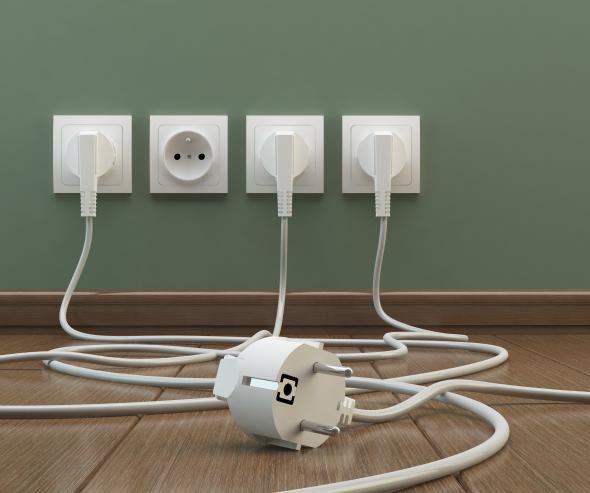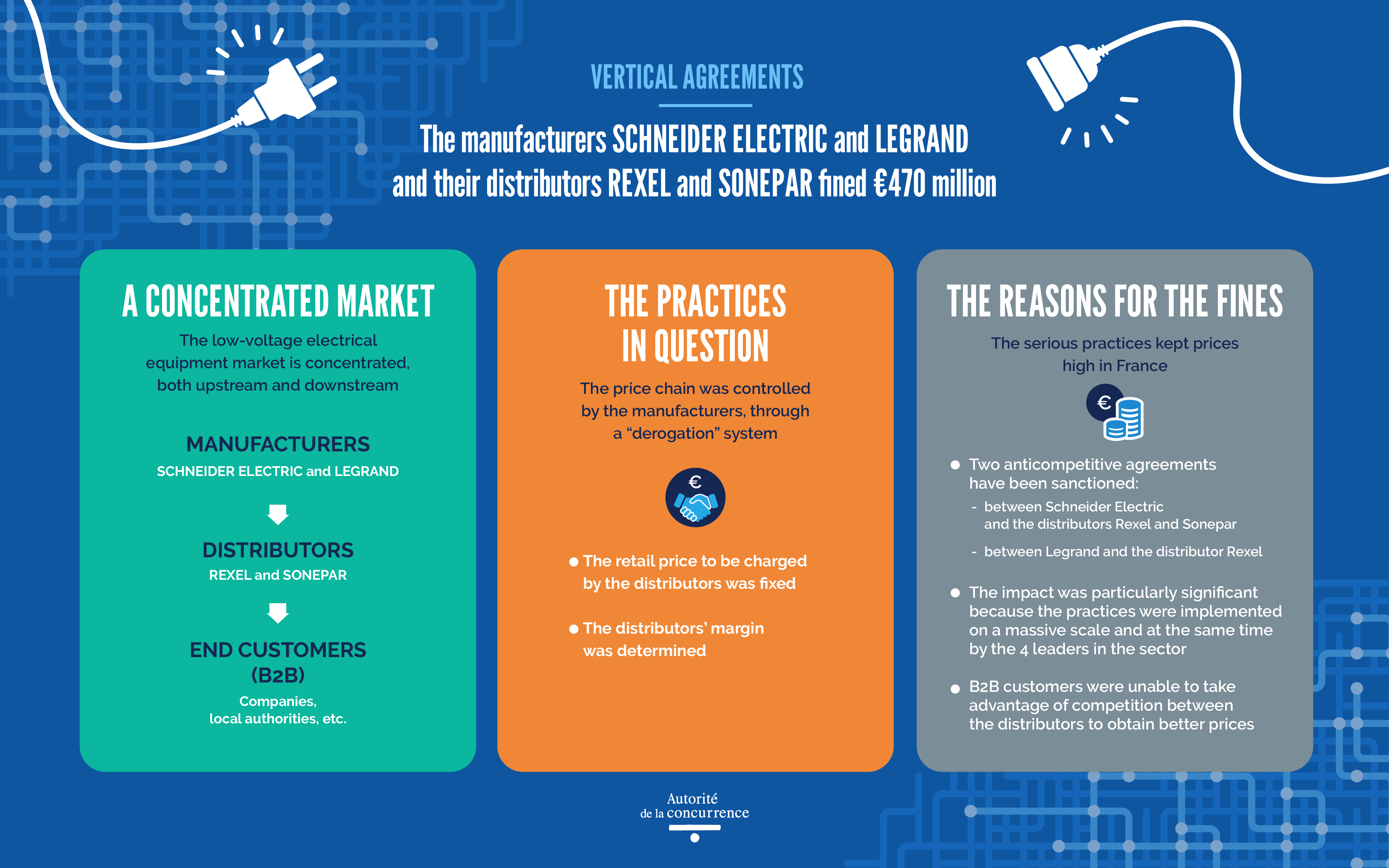Electrical equipment: the Autorité imposes fines of €470 million on the manufacturers Schneider Electric and Legrand and the distributors Rexel and Sonepar for vertical resale price fixing

Background
The Autorité de la concurrence has imposed fines totalling €470,000,000 on two vertical price agreements between manufacturers and distributors in the low-voltage electrical equipment sector. The first agreement was implemented by Schneider Electric and its distributors Rexel and Sonepar from December 2012 to September 2018, while the second was implemented by Legrand and its distributor Rexel from May 2012 to September 2015.
The two agreements took the form of a so-called “derogation” system, which in the case at hand enabled electrical equipment manufacturers to set the resale prices of their products to end customers, and distributors to preserve their margins.
The existence of a criminal law component
The practices came to light following a judicial investigation opened by the Paris Public Prosecutor following a report from the Autorité’s General Rapporteur sent based on Article 40, paragraph 2 of the French Criminal Procedure Code (Code de procédure pénale).
The Autorité’s decision in no way prejudges the outcome of the criminal proceedings.
The “derogation” system
End customers of low-voltage electrical equipment frequently request, often directly from the supplier, lower prices than distributors’ standard purchase prices.
To enable distributors to meet these demands without selling at a loss, annual framework distribution contracts often include a mechanism for adjusting distributors’ standard purchase prices. In concrete terms, the distributor enjoys, through the granting of a credit, a new “derogated” purchase price and can thereby align itself with the price sought by the end customer. The new purchase price is sufficiently low to allow the distributor, if it so wishes, to grant additional price reductions to the end customer, as this option was never prohibited in the contracts in the file examined by the Autorité.
In the case in hand, however, the Autorité found that the companies in question had agreed to neutralise this possibility and, in effect, to fix end-customer selling prices. In so doing, they limited intra-brand competition between distributors, to the detriment of end customers, and helped to maintain high standard prices in France.
The Autorité considers that these practices are particularly serious in that the low-voltage electrical equipment sector is characterised by a high degree of concentration, both upstream and downstream.

Practices uncovered through criminal raids
The practices in question were uncovered by a judicial investigation and raids conducted as part of this investigation.
The judicial investigation was opened in 2018 by the Paris Public Prosecutor following a report by the Autorité’s General Rapporteur sent based on Article 40 of the French Criminal Procedure Code (Code de procédure pénale). The report referred, in particular, to information forwarded by the French Anti-Corruption Agency (Agence française anticorruption) and two anonymous testimonials concerning, among other things, the existence and use by Schneider Electric and Legrand of a so-called “derogated” pricing mechanism aimed at controlling the prices charged to end customers. This mechanism, and other practices likely to constitute criminal infringements, had previously been denounced by the daily newspaper Mediapart.
Under the supervision of the investigating judge, simultaneous raids were conducted at the premises of several companies belonging to the Schneider Electric, Legrand, Rexel and Sonepar groups and the French Federation of Electrical Equipment Distributors (Fédération des Distributeurs en Matériel Electrique), and at the homes of the Chairperson and CFO of Sonepar SAS.
In July 2021, the Autorité started proceedings ex officio into practices in the low-voltage electrical equipment sector and asked the investigating judge to disclose any documents in the criminal file directly related to the facts under investigation.
The introduction of a fixed price system as part of the parties’ “derogated” pricing mechanism
The “derogation” mechanism first appeared in the 1990s in the annual framework contracts signed between suppliers and distributors of low-voltage electrical equipment. Today, most sales by the companies in question come under the mechanism.
Developed in response to demand from end customers, which often request lower prices than distributors’ standard purchase prices, the mechanism is defined as a discount on the standard purchase price, granted in the form of a credit by the manufacturer to the distributor, so that the distributor can offer end customers who so wish lower prices than the standard purchase price (hereinafter “derogated” prices), without reselling at a loss.
In practice, the initial request for a price reduction may come from the end customer, or from the distributor (when the distributor wants to position itself with a particular customer or business). However, the supplier always retains the final say on whether a derogation is granted and on the derogated price granted to the end customer, as well as on the amount of the corresponding credit granted to the distributor.
The Autorité found that there was no contractual provision prohibiting distributors from charging lower prices, and that some contractual documents drawn up by suppliers formally described the new prices granted to end customers as “maximum” or “recommended”.
While the contractual derogation mechanism implemented by Schneider Electric and Legrand was not illegal by its very nature, numerous documents seized during the investigation showed that it was in fact used to support two price-fixing agreements:
- the first between Schneider Electric and its distributors Rexel and Sonepar, from December 2012 to September 2018;
- the second between Legrand and its distributor Rexel, from May 2012 to September 2015.
The Autorité found during its investigation that the companies in question had, as part of these agreements, chosen to fix the derogated prices.
The information in the file showed that although the derogated prices were formally presented as “maximum” or “recommended”, they were in fact conceived by Schneider Electric and Legrand as fixed prices from the outset.
The file also demonstrated that Rexel and Sonepar were aware of what the suppliers were doing (in the case of Sonepar, only of the derogations implemented by Schneider Electric) and that all the parties in questions were aware of the illegality of their practices.
KEEPING PRICE LEVELS ARTIFICIALLY HIGH TO BENEFIT ALL PARTICIPANTS
Nevertheless, the companies in questions knowingly took the risk given the mutual benefits obtained.
On this point, the Autorité found that a fixed price system enabled Schneider Electric and Legrand to reinforce their control over price levels in France, which was already strong under the derogation mechanism, by avoiding any intra-brand competition likely to affect price negotiations with end customers.
With regard to distributors specifically, various documents from Rexel and Sonepar also showed that the companies were aware that they would enjoy a guaranteed margin under the fixed price system sought by Schneider Electric and Legrand.
In total, the Autorité has imposed fines of €470,000,000
In view of the two agreements found, the Autorité has imposed fines totalling €470,000,000, divided between the four companies as shown in the table below:
| Company | Objection 1 | Objection 2 |
|---|---|---|
| Schneider Electric | €207,000,000 | |
| Legrand | €43,000,000 | |
| Rexel | €89,000,000 | €35,000,000 |
| Sonepar | €96,000,000 |
The amount of the fines can be explained in particular by the fact that vertical price-fixing practices are consistently considered among the most serious anticompetitive practices.
In the case at hand, a number of documents showed that the derogation system aimed to maintain high standard prices in France by limiting intra-brand competition, to the detriment of end customers.
In addition, the number, accumulation and interaction of anticompetitive behaviours implemented at the same time are factors that must be taken into account when assessing the seriousness of the facts. In the case at hand, the price-fixing practices were implemented, in part concomitantly, by four leading companies in the manufacture and distribution of low-voltage electrical equipment in France, thus having an even greater impact on the markets concerned, which are concentrated both upstream and downstream.
The Autorité also took into account the fact that the companies in question were aware of the anticompetitive nature of their actions, as well as their significant financial power.
With regard to Rexel in particular, the Autorité noted that the company was heavily involved in the reform of the derogation system, and had made several attempts to convince Schneider and Legrand to join it. This circumstance justified the application of a 20% reduction on the basic amount of the fine incurred.
Lastly, the Autorité has ordered the companies in question to publish a summary of the decision in the print and digital editions of the newspaper Les Echos, as well as in a specialist magazine. The companies must also publish a summary of the decision on their respective websites for a period of seven days.
Decision 24-D-09 of 29 October 2024
Contact(s)

